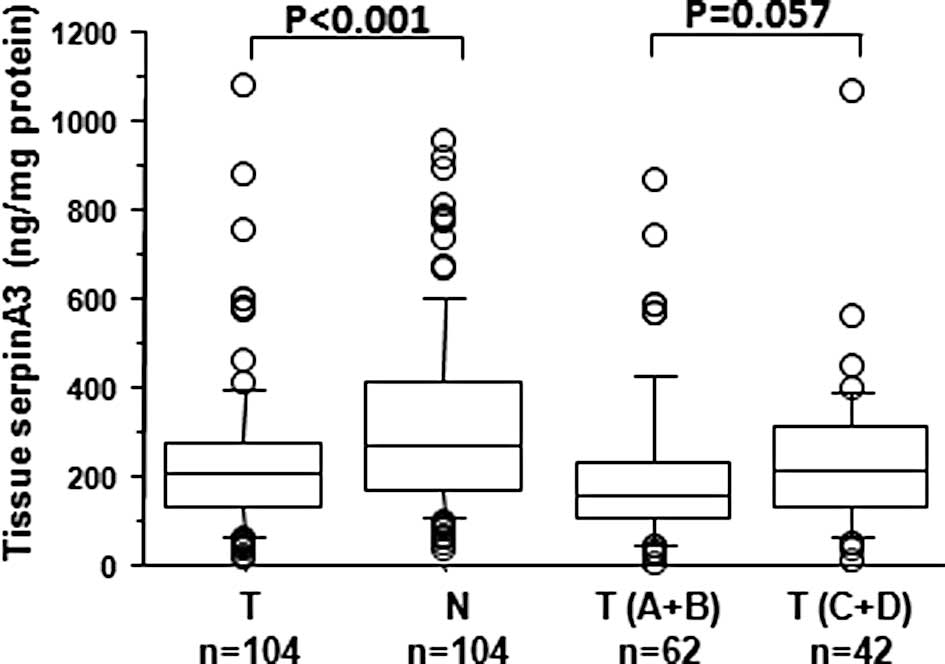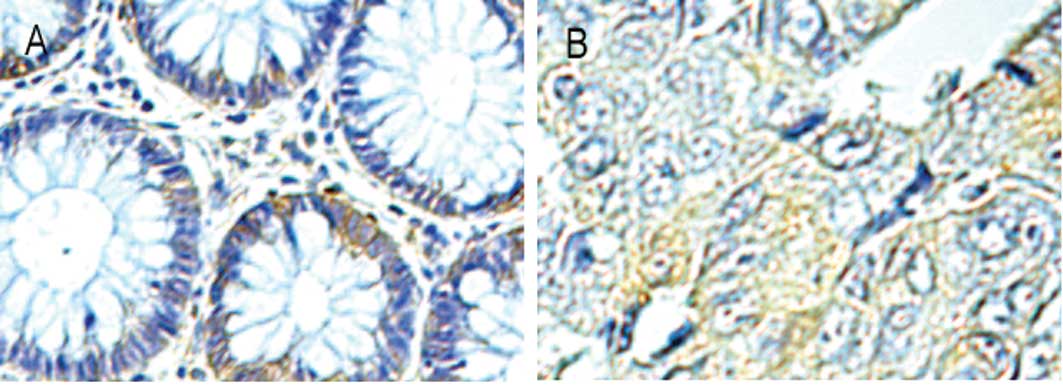|
1
|
Lopez-Otin C and Matrisian LM: Emerging
roles of proteases in tumour suppression. Nat Rev Cancer.
7:800–808. 2007. View
Article : Google Scholar : PubMed/NCBI
|
|
2
|
Stetler-Stevenson WG: The role of matrix
metalloproteinases in tumor invasion, metastasis and angiogenesis.
Surg Oncol Clin N Am. 10:383–392. 2001.PubMed/NCBI
|
|
3
|
Murray GI, Duncan ME, O’Neil P, Melvin WT
and Fothergill JE: Matrix metalloproteinase-1 is associated with
poor prognosis in colorectal cancer. Nat Med. 2:461–462. 1996.
View Article : Google Scholar : PubMed/NCBI
|
|
4
|
Nikkola J, Vihinen P, Vlaykova T,
Hahka-Kemppinen M, Kahari VM and Pyrhonen S: High expression levels
of collagenase-1 and stromelysin-1 correlate with shorter
disease-free survival in human metastatic melanoma. Int J Cancer.
97:432–438. 2002. View
Article : Google Scholar : PubMed/NCBI
|
|
5
|
Kuester D, Lippert H, Roessner A and
Krueger S: The cathepsin family and their role in colorectal
cancer. Pathol Res Pract. 204:491–500. 2008. View Article : Google Scholar : PubMed/NCBI
|
|
6
|
Law RHP, Zhang Q, McGowan S, Buckle AM,
Silverman GA, Wong W, Rosado CJ, Langendorf CG, Pike RN, Bird PI
and Whisstock JC: An overview of the serpin superfamily. Genome
Biol. 7:2162006. View Article : Google Scholar : PubMed/NCBI
|
|
7
|
Gettins PG: Keeping the serpin machine
running smoothly. Genome Res. 10:1833–1835. 2000. View Article : Google Scholar : PubMed/NCBI
|
|
8
|
Kalsheker NA: Alpha-1-antichymotrypsin.
Int J Biochem Cell Biol. 28:961–964. 1996. View Article : Google Scholar
|
|
9
|
Janciauskiene S: Conformational properties
of serine proteinase inhibitors (serpins) confer multiple
pathophysiological roles. Biochim Biophys Acta. 1535:221–235. 2001.
View Article : Google Scholar
|
|
10
|
Allgayer H, Babic R, Grutzner KU, Beyer
BCM, Tarabichi A, Schildberg FW and Heiss MM: Tumor-associated
proteases and inhibitors in gastric cancer: analysis of prognostic
impact and individual risk protease patterns. Clin Exp Metastasis.
16:62–73. 1998. View Article : Google Scholar : PubMed/NCBI
|
|
11
|
Kamboh ML, Minster RL, Kenney M, Ozturk A,
Desai PP, Kammerer CM and DeKosky ST: Alpha-1-antichymotrypsin (ACT
or SERPINA3) polymorphism may affect age-at-onset and disease
duration of Alzheimer’s disease. Neurobiol Aging. 27:1435–1439.
2006.
|
|
12
|
Slowik A, Borratynska A, Turaj W, Pera JP,
Dziedzic T, Figlewicz DA, Betlej M, Krzyszkowski T, Czepko R and
Szczudlik A: Alpha-1-antichymotrypsin gene (SERPINA3) A/T
polymorphism as a risk factor for aneurysmal subarachnoid
hemorrhage. Stroke. 36:737–740. 2005. View Article : Google Scholar : PubMed/NCBI
|
|
13
|
Liu W, Zhu Y, Ge M, Pang Q and Yu Y:
Polymorphism rs4934 of SERPINA3 and sporadic intracranial aneurysms
in the Chinese population. Cerebrovasc Dis. 29:68–72. 2010.
View Article : Google Scholar : PubMed/NCBI
|
|
14
|
Krischek B, Akagawa H, Tajima A, Narita A,
Kasuya H, Hori T and Inoue I: The alanine/threonine polymorphism of
the alpha-1-antichymotrypsin (SERPINA3) gene and ruptured
intracranial aneurysms in the Japanese population. Cerebrovasc Dis.
23:46–49. 2007. View Article : Google Scholar : PubMed/NCBI
|
|
15
|
Erlinger TP, Platz EA, Rifai N and
Helzlsouer KJ: C-reactive protein and the risk of incident
colorectal cancer. JAMA. 291:585–590. 2004. View Article : Google Scholar : PubMed/NCBI
|
|
16
|
Wilson TJ, Nannuru KC and Singh RK:
Cathepsin G-mediated activation of pro-matrix metalloproteinase 9
at the tumor-bone interface promotes transforming growth factor-β
signaling and bone destruction. Mol Cancer Res. 7:1224–1233.
2009.PubMed/NCBI
|
|
17
|
Bendardaf R, Buhmeida A, Hilska M, Laato
M, Syrjänen S, Syrjänen K, Collan Y and Pyrhönen S: MMP-9
(gelatinase B) expression is associated with disease-free survival
and disease-specific survival in colorectal cancer patients. Cancer
Invest. 28:38–43. 2010. View Article : Google Scholar : PubMed/NCBI
|
|
18
|
Wang Y, Jiang H, Dai D, Su M, Martinka M,
Brasher P, Zhang Y, McLean D, Zhang J, Ip W, Li G, Zhang X and Zhou
Y: Alpha 1 antichymotrypsin is aberrantly expressed during melanoma
progression and predicts poor survival for patients with metastatic
melanoma. Pigment Cell Melanoma Res. 23:575–578. 2010. View Article : Google Scholar : PubMed/NCBI
|
|
19
|
Castell JV, Gomez-Lechon MJ, David M,
Andus T, Geiger T, Trullenque R, Fabra R and Heinrich PC:
Interleukin-6 is the major regulator of acute phase protein
synthesis in adult human hepatocytes. FEBS Lett. 242:237–239. 1989.
View Article : Google Scholar : PubMed/NCBI
|
|
20
|
Chung YC and Chang YF: Serum interleukin-6
levels reflect the disease status of colorectal cancer. J Surg
Oncol. 83:222–226. 2003. View Article : Google Scholar : PubMed/NCBI
|
|
21
|
Coussens LM and Werb Z: Inflammation and
cancer. Nature. 420:860–867. 2002. View Article : Google Scholar : PubMed/NCBI
|
|
22
|
Balkwill F: Chemokine biology in cancer.
Semin Immunol. 15:49–55. 2003. View Article : Google Scholar : PubMed/NCBI
|
|
23
|
Trichopoulos D, Psaltopoulou T, Orfanos P,
Trichopoulou A and Boffetta P: Plasma C-reactive protein and risk
of cancer: a prospective study from Greece. Cancer Epidemiol
Biomarkers Prev. 15:381–384. 2006. View Article : Google Scholar : PubMed/NCBI
|
















